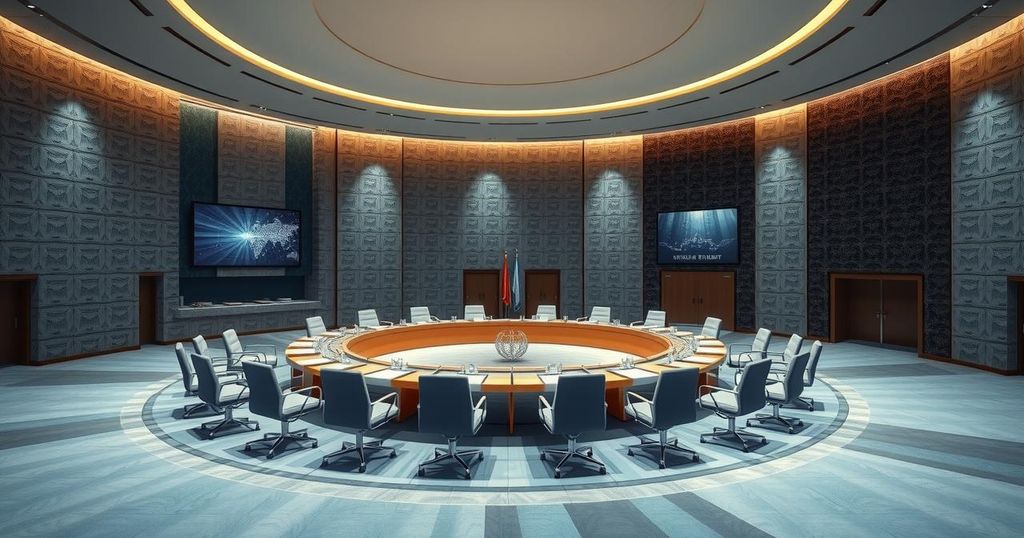Global news
ALI KHAMENEI, ASIA, BRITAIN, DIPLOMACY, DONALD TRUMP, EUROPE, EUROPE/ASIA, FRANCE, GERMANY, GREECE, IAEA, INTERNATIONAL ATOMIC ENERGY AGENCY, INTERNATIONAL RELATIONS, IRAN, KHAMENEI, NORTH AMERICA, NUCLEAR POLICY, NUCLEAR WEAPONS, PANAMA, RUSSIA, SANCTIONS, SECURITY COUNCIL, SOUTH KOREA, UN SECURITY COUNCIL, UNITED KINGDOM, UNITED NATIONS SECURITY COUNCIL, UNITED STATES, US
Leila Ramsay
0 Comments
UN Security Council Set to Address Iran’s Nuclear Expansion Concerns
The UN Security Council will hold a closed meeting to discuss Iran’s growing uranium stockpile and compliance with international regulations, amid concerns from multiple member states. The possibility of restoring sanctions exists, as Iran’s nuclear activities escalate. The U.S. issues an ultimatum to Iran regarding its nuclear infrastructure amidst diplomatic tension and potential negotiations.
The United Nations Security Council will convene behind closed doors on Wednesday to address the escalating concerns regarding Iran’s growing stockpile of uranium enriched to near weapons-grade levels. This meeting was requested by six of the council’s 15 member nations, including France, Greece, Panama, South Korea, the United Kingdom, and the United States. A primary concern is Iran’s failure to comply with the International Atomic Energy Agency (IAEA) regarding undeclared nuclear material found at various sites within Iran.
Western nations contend that Iran lacks a legitimate civilian rationale for enriching uranium to such high levels, noting that no nation has pursued similar enrichment without advancing nuclear weapons programs. Conversely, Iran claims its nuclear ambitions are exclusively peaceful. Furthermore, the United Kingdom, France, and Germany are prepared to employ the “snapback” mechanism to restore international sanctions, should Iran not comply with its nuclear obligations.
The opportunity for the snapback action is limited, as the underlying 2015 UN resolution, which supports the Iran nuclear deal, is due to expire on October 18. Embedded within the Joint Comprehensive Plan of Action (JCPOA), this mechanism allows signatories to reinstate sanctions if Iran fails its commitments. Following the U.S. withdrawal from the JCPOA in 2018, only the European nations—Britain, France, and Germany—retain the capability to initiate snapback before the expiration of Resolution 2231 in October 2025.
Amidst rising tensions, the U.S. and its allies pushed for the Security Council meeting, with President Trump reportedly issuing an ultimatum to Iran’s Supreme Leader, Ali Khamenei. The choices presented were to either mitigate Iran’s nuclear and military activities or face potential military action aimed at dismantling its nuclear infrastructure. Khamenei responded firmly, emphasizing that Iran would not negotiate under such pressure and denouncing the increasing Western demands, which now include curtailing Iran’s regional influence and missile capabilities.
However, Russia has indicated that Iran might be open to negotiating limitations on its nuclear program in return for sanctions relief. Additionally, Iran’s delegation at the United Nations has hinted at the possibility of engaging in nuclear talks to mitigate fears stemming from U.S. military threats against its nuclear facilities. Iran’s Foreign Minister, Abbas Araghchi, confirmed ongoing discussions with European countries to “build trust”—reflecting an attempt by Iran to manipulate divisions among the U.S. and its allies to alleviate international pressure.
In summary, the United Nations Security Council’s upcoming meeting reflects international apprehensions regarding Iran’s nuclear advancements and compliance with IAEA regulations. The potential snapback of sanctions presents urgent measures from the UK, France, and Germany to maintain oversight of Iran’s nuclear activities. Iran’s response underscores its resilience against external pressures, while possible negotiations indicate an openness to dialogue. The geopolitical landscape remains intricate, particularly given the interactions among the U.S., European allies, and Iran.
Original Source: irannewsupdate.com




Post Comment